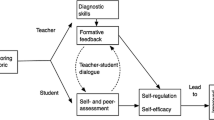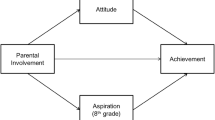Abstract
In this investigation I explore teachers’ perspectives on just grade allocation. The study was carried out among language, math and science teachers in a national sample of Israeli high schools, where teachers were required to weigh a set of considerations that are used in the decision on grade allocation. Findings suggest that (a) a teacher’s decision is based on a weighted combination of multi-principles of allocation, (b) equity by output (students proved academic success) is the ruling consideration, and (c) the weight given to the various considerations differ by teachers’ subject matter expertise. The appeared difference placed science teachers vis-à-vis math and language teachers, unlike the expected humanities (language)—sciences (math and science) dichotomy. Comparison of grading considerations by student capacity suggests that about half of the teachers consider differential grading considerations for “weak” and “strong” students as just, attributing greater weight to academic input (effort) and need for encouragement when grading their “weak” students.
Similar content being viewed by others
References
Bidwell, C. E. (1965). The school as a formal organization. In J. G. March (Ed.), Handbook of organizations (pp. 972–1022). Rand McNally.
Brantlinger E.A. (1993). The politics of social class in secondary school. Teachers College Press, New York
Bruner J.S. (1960). The process of education. Harvard University Press, Cambridge
Butler R. (1987). Task-involving and ego-involving properties of evaluation: Effect of different feedback conditions on motivational perceptions, interest and performance. Journal of Educational Psychology 79: 474–482. doi:10.1037/0022-0663.79.4.474
Butler R. (1988). Enhancing and undermining intrinsic motivation: The effect of task-involving and ego-involving evaluation of interest and performance. The British Journal of Educational Psychology 58: 1–14
Connell R.W. (1993). Schools and social justice. Temple University Press, Philadelphia
Dar Y. (1985). Teachers’ attitudes toward ability grouping: Educational considerations and social and organizational influences. Interchange 16: 17–38. doi:10.1007/BF01807206
Dar Y. and Resh N. (2001). Exploring the multifaceted structure of sense of deprivation. European Journal of Social Psychology 31: 63–81. doi:10.1002/ejsp.32
Dauber S.L., Alexander K.L. and Entwisle D.R. (1996). Tracking and transition through middle grades: Channeling educational trajectories. Sociology of Education 69: 290–307. doi:10.2307/2112716
Deutsch M. (1975). Equity, equality and need: What determines which value will be used as a basis of distributive justice. The Journal of Social Issues 31: 137–149
Deutsch M. (1979). Education and distributive justice. Some reflections on grading systems. The American Psychologist 34: 301–401. doi:10.1037/0003-066X.34.5.391
Dreeben R. (1967). The contribution of schooling to the learning of norms. Harvard Educational Review 37: 211–237
Dushnik L. and Sabar Ben-Yehoshua N. (2000). Intentions vs. abilities: The ethical dilemmas facing Israeli teachers in the 90s. Megamot 40: 42–465. (Hebrew)
Ensminger M.E. and Slusarcick A.L. (1992). Path to high school graduation or dropout: A longitudinal study of first grade cohort. Sociology of Education 65: 95–113. doi:10.2307/2112677
Entwisle, D. R., & Alexander, K. L. (1993). Entry into school: The beginning school transition and educational stratification in the US. Annual Review of Sociology, 401–423. doi:10.1146/annurev.so.19.080193.002153.
Entwisle D.R., Alexander K.L. and Olson D.E. (2007). Early schooling: The handicap of being poor and male. Sociology of Education 80: 114–138
Entwisle D.R. and Hayduk L.A. (1982). Early schooling: Cognitive and affective outcomes. John Hopkins University Press, Baltimore, MD
Farkas G., Grobe R.P., Sheehan D. and Shuan Y. (1990). Cultural resources and school success: Gender, ethnicity and poverty groups within an urban school district. American Sociological Review 55: 127–142. doi:10.2307/2095708
Grossman P.L. and Stodolsky S.S. (1995). Content as content: The role of school subjects in secondary school teaching. Educational Researcher 24(8): 5–11
Hallinan M. and Kubitschek W. (1990). The formation of intransitive friendship. Social Forces 69: 505–519. doi:10.2307/2579671
Jasso G. and Resh N. (2002). Exploring the sense of justice about grades. European Sociological Review 18: 333–351. doi:10.1093/esr/18.3.333
Jencks C. (1988). Whom must we treat equally for educational opportunity to be equal?. Ethics 98: 518–533. doi:10.1086/292969
Lortie D. (2002/1975). Schoolteacher: A sociological study. University of Chicago Press, Chicago
(1990). The contexts of teaching in secondary schools: Teachers’ realities. Teachers College Press, New York
Miller S. (1998). Shortcut: High school grades as a signal of human capital. Educational Evaluation and Policy Analysis 20: 299–311
Nissan M. (1982). Motivational aspects of evaluation in schools. In: Lewy, A. (eds) Evaluation roles, pp 131–148. Gordon & Breach, London
Nissan M. (1985). Justice in the classroom: Teachers’ and students’ perceptions of principles that guide grading distribution. In: Lam, Z. (eds) School and education, pp 141–155. Magnes (Hebrew), Jerusalem
Pollio H.R. (1996). The two cultures of pedagogy: Teaching and learning in the natural sciences and humanities. Teaching and Learning Issues 75: 3–33
Resh N. (1998). Track placement: How the ‘Sorting Machine’ works in Israel. American Journal of Education 106: 416–438. doi:10.1086/444190
Resh N. and Kramarski B. (2007). Teachers’ beliefs and pedagogical practices. Educational Theory and Practice 29(2): 27–48
Resh N. and Sabbagh C. (2009). Justice in teaching. In: Saha, L. and Gary Dworkin, A. (eds) International handbook of research on teachers and teaching, pp. Springer, Dordrecht
Roscingo V.J. and Ainsworth-Darnell A.W. (1999). Race, cultural capital and educational resources: Persistant inequalities and achievement returns. Sociology of Education 72: 158–178. doi:10.2307/2673227
Sabbagh C. (2001). The Multi-dimensional structure of distributive justice Judgments. NCJW Research Institute of Innovation in Education, The Hebrew University (Hebrew), Jerusalem
Sabbagh C., Dar Y. and Resh N. (1994). The structure of social justice judgments: A facet approach. Social Psychology Quarterly 57: 244–261. doi:10.2307/2786879
Sabbagh C., Resh N., Mor M. and Vanhuysse P. (2006). Spheres of justice within schools: Reflections and evidence on the distribution of educational goods. Social Psychology of Education 9: 97–118. doi:10.1007/s11218-005-3319-9
Schiller K.S. (1999). Effects of feeder patterns on students’ transition to high school. Sociology of Education 72: 216–233. doi:10.2307/2673154
Schwarzwald J. and Fridle-Cohen S. (1984). Social acceptance in the heterogeneous classroom: Its relationship to ethnic origin and academic status. Megamot 28: 404–424. (Hebrew)
Seginar R. (1983). Parents’ educational expectations and children’s academic achievement: A literature review. Merrill-Palmer Quarterly 29: 1–23
Siskin L.S. (1994). Realms of knowledge: Academic departments in secondary school. Falmer Press, Washington, DC
Stodolsky S.S. (1993). A framework for subject matter comparisons in high schools. Teaching and Teacher Education 41: 33–346
Stodolsky S.S. and Grossman P. (2000). Changing students, changing teaching. Teachers College Record 102: 125–172. doi:10.1111/0161-4681.00050
Tyack D. and Tobin W. (1994). The “grammer” of schooling: Why it has it been so hard to change?. American Educational Research Journal 31: 453–479
Vanfossen B., Jones J. and Spade J. (1987). Curriculum tracking and status maintenance. Sociology of Education 43: 355–376
Walzer M. (1983). Spheres of justice. Basic Books, New York
Author information
Authors and Affiliations
Corresponding author
Rights and permissions
About this article
Cite this article
Resh, N. Justice in grades allocation: teachers’ perspective. Soc Psychol Educ 12, 315–325 (2009). https://doi.org/10.1007/s11218-008-9073-z
Received:
Accepted:
Published:
Issue Date:
DOI: https://doi.org/10.1007/s11218-008-9073-z




